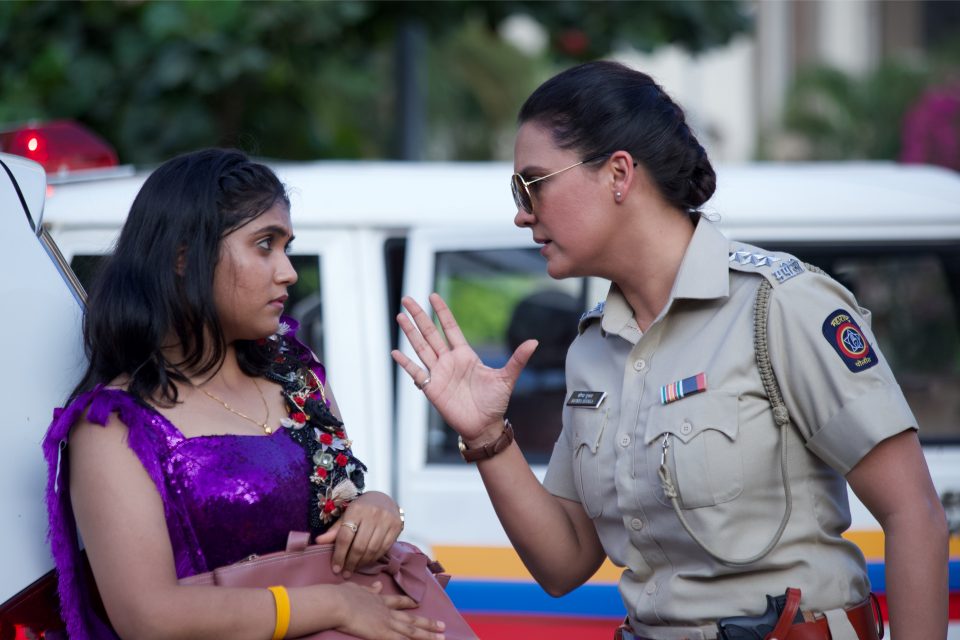‘Hundred’ Review: Masala Series Never Zeroes In On the Bulls-Eye
The series about a Mumbai cop and terminal patient on a mission succumbs to a ton of subplots despite a solid premise

Rinku Rajguru as Netra Patil and Lara Dutta Bhupathi as Saumya Shukla in ‘Hundred.’ Photo: Disney+ Hotstar
★ ★ ½
Hundred is what happens when the typical Bollywood masala flick is reinvented for streaming, sans the toxic heroism (CC: Dabangg). The Disney+ Hotstar VIP series dropped last week and follows the journey of two unlikely accomplices–cop (DCP) Saumya Shukla (Lara Dutta Bhupathi) and census department employee Netra Patil (Rinku Rajguru)–who help each other meet their goals by means crooked or straight.
When Patil is diagnosed with a malignant tumor and realizes she has only 100 days to live, Shukla enlists her as an undercover operative for the Mumbai Police. “Danger, risk, excitement. Tumhaari zindagi koi film se kam nahi hogi (Your life will be just like a movie,)” she tells her fellow government employee. Looking to spend her remaining days like a movie’s hero, Patil sets about chasing thrills to a Bollywood soundtrack while Shukla tries her best to outrun a department that’s hell-bent on benching her. The dysfunctional duo finds the odds stacked against them with a ticking clock and familiar enemies dictating and double-checking their every move. Do they beat the game or hack its rules?
Hundred has a solid premise–two people spoofing the system to be the heroes they always were–and the eight-episode series is entertaining and gripping at the outset, much like a good ol’ masala entertainer in theaters. But it soon goes from being amusing to a practice in patience.

Lara Dutta Bhupathi as Saumya Shukla in ‘Hundred.’ Photo: Disney+ Hotstar
A chase sequence ensues in the first episode, culminating in Shukla nabbing a criminal. Her victory is ultimately short-lived as junior officer Diwakar Asole (Jayant Gadekar) makes a dramatic entry and takes over the case. The scene does well to establish the sexism that Shukla experiences at the workplace where all the major cases are given to male inspectors and her authority is manipulatively undermined by Parmeet Sethi’s ACP Anshuman (the department is content slapping her face on every tokenistic poster and making her helm every event to check their box of having empowered women). The scene is also a mirror for the plot where much like Asole and Anshuman, random subplots and characters unexpectedly turn up to add noise and inane threads to what would have otherwise been an airtight narrative.
From random theft and sketchy companies to financing a music video and helping a friend in need, the plot meanders, half-heartedly dipping into wombly subplots that do little to pique interest but instead distract from the main play at hand–Shukla, Patil and the politics that permeate their lives. Too many cooks spoil the broth and Hundred suffers from a classic case of overcompensation with an opening that goes from wildly entertaining to meh in two episodes flat. However, what keeps the rhythm going in the series are the characters and the dialogue that, like most masala capers, pack a lasting punch.

Rinku Rajguru as Netra Patil in ‘Hundred.’ Photo: Disney+ Hotstar
It’s only when the two protagonists team-up that Hundred seems to work best. Shukla and Patil are anti-heroes. They aren’t trying to save the day as much as they’re going rogue for credit and having all-out fun. The women are twisted, selfish and brilliant, sometimes nefarious even. And it’s in their characterization that writers Ruchi Narain, Ashutosh Shah and Abhishek Dubey nail the layers they failed to successfully unravel in the congested plot. Dutta Bhupathi is unapologetically assured in her portrayal of a frustrated and merciless cop while Rajguru is fearless in her rendering of a person with nothing left to lose. Hundred subverts many a masala film’s stereotypes by letting its characters be as brazen and flawed as their male counterparts have been allowed to be on the silver screen and it’s refreshing to watch a female cop and a government employee make mistakes and make it big.
The duo is backed by an eclectic crew of characters (Karan Wahi’s Haryanvi rapper Maddy, Suyash Zunjurke’s foolish investor Aniket, Rajeev Siddhartha’s debonair racketeer Shantanu and Sethi’s relentlessly sexist ACP Anshuman) that while slaves to the plot’s devices do hold up strong and entertain over the five-hour runtime of the series, exposing the protagonists’ true motives while accounting for many a (predictable) twist in the series.
The dialogue too is engaging, with Shukla’s shameless and sardonic narration (“Har aurat jo successful banna chahti hai… uske peeche kahi aadmi hote hai jo uske liye decisions lena chahte hai–Behind every woman pursuing success is a slew of men who want to make her decisions for her”) making for quite the intriguing guide to Hundred’s grey world of crime, adventure and ambition while Patil’s theatrical antics are verbalized in memorable but melodramatic one-liners (“Heroine toh main hoon hi shakal se. Aur kaam se? Hero. Samajhla?–I’m a heroine by face and hero by work. Understood?”) that Rajguru delivers with effortless levity.
The show’s hamartia ultimately is its web of complexity. In its attempt to capture the intricacies of the protagonists’ lives, Hundred devolves into an unnecessarily drawn-out goose chase within a hedge maze of a plot that leaves you wondering whether the show directed by Narain, Shah and Taher Shabbir would’ve worked better as a mini-series or a two-hour movie. Hundred’s redemption, however, lies in its sense of comedy which is attuned to what most cinema-goers in the country love–masala–and you’ll be hard-pressed to find the series not delivering its sprinklings in abundance with a flawed but needed (cis female) perspective (it’s not as in-your-face as Mardaani) that marks a welcome departure from the toxic masculinity parading as sacrosanct on the silver screen.
The best way to watch the series is with a balanced perspective. Don’t expect a clear-cut, astute look into Mumbai’s order and underworld but a cheeky, cynical and at times outrageously inane dive into the lives of the people who operate across its drawn lines. As comedian Kanan Gill elucidated in a recent stand-up special: some entertainment is just time-pass. And Hundred, depending on what you’re craving, just might be your poison.



